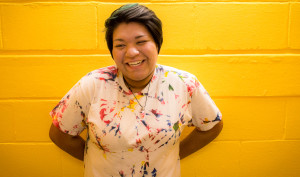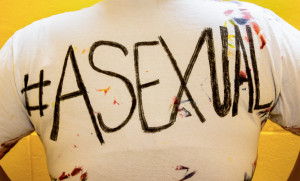Tags
Related Posts
Share This
Asexuality: A Q/A
As part of our 2015 initiative to foster dialogue about gender and sexuality on campus, Jackalope Magazine conducted a Facebook interview with freshman Creative Writing major Marisa Zapata about asexuality and the stigma behind it.
Jackalope Magazine: Everyone has their own definitions for the labels they identify as. What’s your definition of asexuality?
Marisa Zapata: To me, asexuality is just like any other sexuality. It’s something that is second nature. I don’t have to try to be asexual; I just am and I have learned that I can’t change that. So my definition of asexuality is not having a natural sexual drive… I’m just not a sexually driven person and I don’t have a natural urge to have sex.
JM: That makes sense. It is just like every other sexuality.
MZ: Yeah, it’s something you don’t think about. It’s just there. It’s a part of you.
JM: Totally. When did you figure out you were asexual?
MZ: I knew probably back when I was in junior high but then I had no idea what the feeling I had was. I didn’t hear the term “asexual” used to describe people’s sexuality until the end of freshman year of high school but I didn’t identify with asexuality until junior year of high school when the label felt more comfortable.
JM: What changed that made you more comfortable?
MZ: I was raised a Christian and so I felt like any label other than heterosexual was wrong. But it made me uncomfortable to hear people say that when you get married to your future husband you become “one” which all of us knew meant sex. Sex was something people did to start off a “fruitful” marriage, as most of the people in my former church would say. It always made me uncomfortable to think of me having sex with someone even if I loved them. So I would make a joke that I would become a nun so that way I wouldn’t have to have sex. I think [I became more comfortable] once I was able to get on the internet and not be afraid to look up what other sexualities are out there. I was able to find people who had the same feelings that I did. I started to admit to myself that being asexual wasn’t wrong in anyway and then soon I felt proud enough with my label to let others know.
JM: That’s awesome that you’re so proud of your label now.
MZ: Yeah, but it’s still a label you have to explain to people. I recently was able to explain it to my mom and she’s still a little confused about it but at least she is willing to understand my sexuality.
JM: What sort of reactions do you get when you tell people you’re asexual?
MZ: Most people are supportive of me, especially people who have known me or get to know me before knowing my sexuality. But anyone who is attracted to me or people who are interested in me could possible find it as an issue, unless they are asexual.
JM: Why do you think it’s an issue for some people?
MZ: In a previous relationship I had issues with the fact that when I would suggest we have sex and because they didn’t identify as asexual they would say things like ‘well I don’t want to make you have sex if you don’t want to’ or ‘well you don’t like sex.’ They know coming into the relationship I was asexual and they knew how I felt. But the thing they didn’t seem to understand is that, yeah I don’t have a sexual drive but if I like you or love you enough and I know you want to have sex then I want to have sex with you to please you.
JM: So you’re romantically attracted to people, then? Can you explain the difference a little bit? Between sexual and romantic attraction?
MZ: Yes I’m romantically attracted to people but there is also this natural intuition in everyone to look at someone and be attracted to people. I guess I appreciate people who are attractive looking but it ultimately comes down to if we have an emotional connection. I guess when I am interested in people I imagine us going on dates, holding hand, kissing but never think ‘wow, I want to have sex with this person.’ I’m more romantically driven.
JM: Why do you think there’s such a stigma around asexuality?
MZ: That’s a difficult question. I guess with any sexuality there are stigmas. Everyone gets incorrectly judged and I think because asexuality is newer in the spectrum of sexuality that not everyone knows how to feel about it. People think it’s silly and not real or they assume that because you’re asexual you are opposed to sex. Asexuality does not mean abstinence. I think that is one stigma people automatically think when they hear that someone is asexual.
JM: Why do you think people find it hard to understand?
MZ: Hard for people to understand asexuality doesn’t mean abstinence?
JM: That and asexuality in general.
MZ: I’m not really sure. I guess people find it impossible for people to not have a sexual drive. Humans are sexual beings because it’s in our nature and subconsciously something we are supposed to have in common, but there are people like me who just don’t and it’s hard for people to wrap their heads around that. I think the common mistake with assuming asexual means abstinence is understandable but people have to understand that nuns and priests vow to abstinence but it doesn’t mean they don’t have sexual desires. Abstinence is something you choose and asexuality isn’t.








 Jackalope Magazine is the student magazine of Santa Fe University of Art and Design. Building on the interdisciplinary nature of our education, we aim to showcase the talent of our university and character of our city.
Jackalope Magazine is the student magazine of Santa Fe University of Art and Design. Building on the interdisciplinary nature of our education, we aim to showcase the talent of our university and character of our city.
Recent Comments